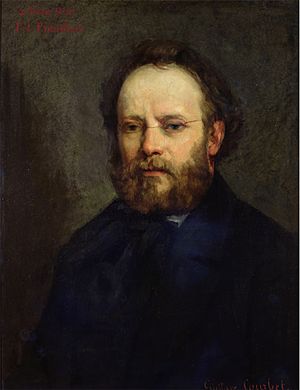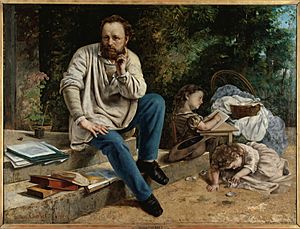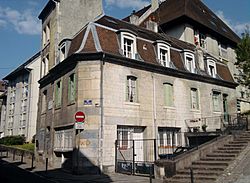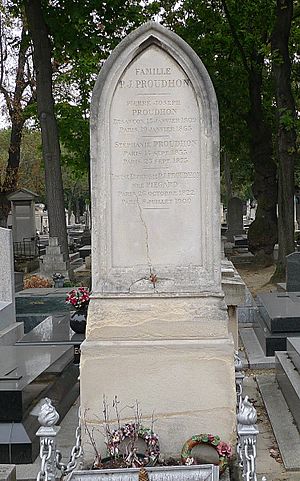Pierre-Joseph Proudhon facts for kids
Quick facts for kids
Pierre-Joseph Proudhon
|
|
|---|---|

Portrait by Gustave Courbet, 1865
|
|
| Born | 15 January 1809 Besançon, France
|
| Died | 19 January 1865 (aged 56) Passy, Paris, France
|
| Era | 19th-century philosophy |
| Region | Western philosophy |
| School | |
|
Main interests
|
|
|
Notable ideas
|
|
|
Influences
|
|
|
Influenced
|
|
| Signature | |
 |
|
Pierre-Joseph Proudhon (born January 15, 1809, in Besançon, France – died January 19, 1865, in Paris) was an important French thinker. Many people call him the "father of anarchism." He was a socialist, politician, philosopher, and economist. He created a philosophy called mutualism.
Proudhon was the first person to call himself an anarchist. He is known as one of the most important thinkers in anarchism. After the French Revolution of 1848, he became a member of the French Parliament. He then started calling himself a federalist.
Proudhon believed in a type of freedom that mixed "community" and "property." Some people see his ideas as part of individualist anarchism. Others think they are part of social anarchism.
Proudhon was a printer who taught himself Latin. This helped him print books in that language better. His most famous idea is "property is theft!" He wrote this in his first big book, What Is Property? Or, an Inquiry into the Principle of Right and Government, published in 1840.
This book got the attention of the French government. It also interested Karl Marx, another famous thinker. Marx and Proudhon wrote to each other and even met in Paris. Their friendship ended when Marx wrote a book called The Poverty of Philosophy. This book was a strong response to Proudhon's The System of Economic Contradictions. Their disagreement helped cause a split between anarchists and Marxists. This split continued in the International Working Men's Association.
Proudhon supported workers' councils and cooperatives. He thought workers and farmers should own their land and workplaces. He believed that big social changes could happen peacefully. Proudhon tried to start a national bank that would give loans without interest. This bank would have been funded by a tax on rich people, but it did not work out.
After Proudhon, his ideas led to different types of libertarian socialism. These included individualist anarchism, collectivist anarchism, anarcho-communism, and anarcho-syndicalism.
About Proudhon's Life
Early Years and Learning
Proudhon was born in Besançon, France, on January 15, 1809. His father, Claude-François Proudhon, was a brewer and barrel maker. His mother, Catherine Simonin, was from a nearby village. Proudhon had five brothers, but two died very young.
As a child, Proudhon worked in his family's tavern. He also helped with farm work and played outside. He did not go to school formally at first. His mother taught him to read when he was three. The only books he read until he was 10 were the Gospels and some local almanacs.
In 1820, Proudhon's mother tried to get him into the city college in Besançon. His family was too poor to pay for it. But with help from his father's old boss, they got a scholarship. Still, Proudhon could not afford books or shoes for school. This made things hard, and richer classmates sometimes made fun of him. Despite this, Proudhon loved to learn. He spent a lot of time in the school library, reading many different books.
Starting in Printing
In 1827, Proudhon began training at a printing press. The next year, he moved to a press in Besançon owned by a schoolmate's family. Besançon was a center for religious ideas. Most books printed there were about religion. Proudhon spent hours reading these Christian books. This made him question his own religious beliefs. Eventually, he stopped believing in Christianity.
Over time, Proudhon became a proofreader at the press. By 1829, he became more interested in social issues. He met Charles Fourier, a social thinker, who came to the press to print his book. Proudhon oversaw the printing and talked with Fourier often. These talks greatly influenced Proudhon.
During this time, Proudhon also became close friends with Gustave Fallot. Fallot was a rich scholar who was impressed by Proudhon's work. They spent evenings discussing French writers like Michel de Montaigne and Jean-Jacques Rousseau. Proudhon had not read these authors before.
Choosing Philosophy and Writing
In 1830, Proudhon became a certified printer. After this, he struggled with unemployment and poverty. He traveled around France and even to Switzerland looking for work. Fallot offered to help Proudhon financially if he came to Paris to study philosophy. Proudhon accepted, even though he worried about his printing career.
He walked from Besançon to Paris. In Paris, he met Fallot's friends, who were scholars. Proudhon felt out of place among them. He preferred to study alone and missed his home in Besançon. A cholera outbreak in Paris made Fallot sick, so he could no longer support Proudhon. Proudhon left Paris and never saw Fallot again. This friendship was very important because it led Proudhon to leave printing and study philosophy.
After a failed printing business in 1838, Proudhon decided to focus on studying. He applied for a scholarship called the Suard Pension. He was chosen because he had little money, and the judges were impressed by his writing. Proudhon arrived in Paris in late 1838.
Early Books and Ideas
In 1839, Proudhon entered an essay contest. His essay, De la Célébration du dimanche, talked about political and philosophical ideas. It contained early versions of his revolutionary thoughts. Many of his ideas about authority and property worried the judges. He only won a bronze medal, which Proudhon was proud of because it showed his writing made powerful people uncomfortable.
In 1840, Proudhon published his first major work, Qu'est-ce que la propriété? (What Is Property?). In 1842, he published another work called Warning to Proprietors. He was put on trial for it, but the jury found him innocent. They said they could not condemn him for ideas they did not understand.
In 1846, he published The System of Economic Contradictions, or The Philosophy of Poverty. This book led to Karl Marx writing The Poverty of Philosophy. This started a long disagreement between anarchism and Marxism.
For a while, Proudhon ran a small printing business in Besançon, but it failed. Later, he worked as a manager for a business in Lyon, France. In 1847, he moved to Paris. He was becoming known as an important thinker. That year, he also joined the Freemasons.

In Spain, Ramón de la Sagra started an anarchist newspaper in 1845. It was based on Proudhon's ideas. Francesc Pi i Margall, a Spanish politician, translated many of Proudhon's books into Spanish. Pi i Margall later became the President of Spain for a short time in 1873. Proudhon's ideas greatly influenced Spanish anarchism.
Later Life and Death
Proudhon died in Passy, Paris, on January 19, 1865. He was buried in the Montparnasse cemetery in Paris.
Proudhon's Main Ideas
Anarchism
Proudhon was the first person to call himself an "anarchist." His ideas, called anarchist mutualism, are seen as a mix between individualist anarchism and social anarchism. Proudhon believed in "no government of man by man."
In What Is Property?, Proudhon said anarchy means "the absence of a master, of a sovereign." He wrote that "society seeks order in anarchy." In 1849, he declared that "Whoever lays his hand on me to govern me is a usurper and tyrant." In The General Idea of the Revolution (1851), he called for a "society without authority."
Later in his life, Proudhon changed some of his views. In The Principle of Federation (1863), he suggested a "decentralized theory of federal government." He also argued that "property is the only power that can act as a counterweight to the State."
How Society Should Work
Proudhon believed in free association. This meant that workers should control their own workplaces. He wanted factories and businesses to be run by "democratically organized workers' associations." He thought these groups should be examples for all parts of the economy.
He believed that workers should not sell their labor to a boss. Instead, they should work for themselves in cooperatives. This would stop "capitalistic and proprietary exploitation" and end the wage system. It would also ensure "equal and just exchange."
Historians like Robert Graham note that Proudhon's ideas for a market economy were tied to workers managing their own businesses. Proudhon wanted workers to decide how their businesses were run each day.
Mutualism
Proudhon used the term mutualism for his type of anarchism and socialism. It meant that workers would control the ways things are made. He imagined self-employed craftspeople, farmers, and cooperatives trading their goods. Large workplaces would be run by "labor associations" using direct democracy.
He wanted to get rid of the state. Instead, society would be organized by a group of "free communes." A commune is a local town or district in France. In 1863, Proudhon said his economic ideas were about "agricultural-industrial federation." His political ideas were about "political federation or decentralization."
Proudhon called his idea of owning things for use possession. He had many reasons against owning large amounts of land or capital. He thought it led to unfair profits, debt, and even war. He also believed it created bosses who controlled workers.
Proudhon was against both capitalist and state ownership of property. He believed that "property is the greatest revolutionary force." He thought it could balance the power of the State and protect individual freedom. However, he still opposed large amounts of wealth and property. He supported small-scale ownership for farmers and craftspeople. He also believed property should be more equally shared and limited to what people actually use.
Proudhon was against charging interest and rent. But he did not want to make them illegal. He believed these activities should be free and voluntary. He thought they would naturally change if everyone followed his idea of "reciprocity," or mutual exchange.
Against War and Nationalism
Proudhon was against dictatorship, militarism, nationalism, and war. He believed that ending militarism was the most important task of his time. He thought that "workers alone are capable of putting an end to war." This would happen by creating a balanced economy.
He argued that under mutualism, there would be no "nationality" or "fatherland" in the political sense. These words would only mean where someone was born. He believed that people, no matter their race, are citizens of the universe.
Proudhon also rejected dictatorship. He called himself a "republican, a democrat even, and a socialist." He criticized what he called "false democracy," which was not focused on economic and social fairness. He wanted to complete the work of the French Revolution of 1789. He contrasted the "old democracy" with a "young democracy," which was a "social democracy."
Property and the State
Proudhon saw privileged property as a form of government. He studied the problems of the capitalist economy. While he strongly criticized capitalism, he also disagreed with other socialists who wanted the state to control the economy.
When Proudhon said "property is freedom," he meant owning the results of one's work. This included a farmer's home, a craftsperson's tools, and the money they earned from selling their goods. For Proudhon, work was the only fair way to get property. What you make is yours, but anything beyond that is not. He supported workers managing their own businesses. He was against private ownership of the means of production.
Revolution and Change
Proudhon was a revolutionary, but he did not mean civil war or violence. Instead, his revolution was about changing society peacefully. He believed this change was about morals and required high ethical standards. He proposed monetary reform and creating credit banks and worker associations. These would help organize society in new ways. This idea of ethical socialism is part of the liberal socialist tradition. It supports equality and free markets, while limiting the power of the state.
Proudhon criticized the 1848 French Revolution for being "without an idea." He thought some parts were too moderate and others too extreme. He also criticized the June Days Uprising for using violence.
The idea of dual power, where two different authorities exist at the same time, was first described by Proudhon. He suggested that worker clubs could become a popular place to plan social changes for the government.
Socialism
Proudhon called himself a socialist, and he is still seen as one. He was one of the first thinkers of libertarian socialism. He was against the state owning capital goods. Instead, he wanted workers to own them through associations. Proudhon greatly influenced the idea of workers' self-management.
He strongly rejected capitalists or the state owning the results of labor. He argued that while "property in product... does not carry with it property in the means of production," the "right to product is exclusive." He believed that "all accumulated capital being social property, no one can be its exclusive proprietor." He thought that society owned the means of production and land. But users would control and run them, with "regulating societies" to "regulate the market."
In Proudhon's time, socialism covered many different ideas. Proudhon's writings show he identified with socialism. But he did not stick to any one specific socialist system. Socialism broadly aims to solve problems in the capitalist economy through big changes. These changes could include getting rid of private property or supporting cooperatives, collective property, or social property.
Proudhon did not publicly criticize Karl Marx because Marx was not well-known during Proudhon's life. Marxism became a large movement only after Proudhon died. However, Proudhon did criticize other authoritarian and state socialists of his time. He disagreed with the French socialist Louis Blanc, saying Blanc wanted a "dictatorship" and "hierarchy."
Proudhon's book What Is Property? convinced the young Marx that private property should be ended. Marx even called Proudhon's work a "scientific manifesto of the French proletariat." However, Marx disagreed with Proudhon's anarchism. Marx later wrote a strong criticism of Proudhon called The Poverty of Philosophy. In their letters, Proudhon told Marx he did not think a violent revolution was needed.
Marx mainly disagreed with Proudhon's understanding of how labor, value, and price worked. Marx also thought Proudhon's criticism of property was based on old ideas, not new ones. Many anarchists say Marx and Marxists have twisted Proudhon's views. Some argue that Marx took many ideas from Proudhon, like his criticism of private property and the idea of "surplus value."
Despite their disagreements, Marx always respected Proudhon to some extent. In Proudhon's obituary, written almost 20 years after The Poverty of Philosophy, Marx called What Is Property? "epoch-making."
Social Ownership
Proudhon supported individual ownership for small properties. But he believed in social ownership and worker cooperatives for larger businesses. He wanted workers to manage their own workplaces. He repeatedly argued that the means of production and land should be owned by society. In What Is Property?, Proudhon wrote that "land is indispensable to our existence, consequently a common thing, consequently insusceptible of appropriation." He also wrote that "all capital... being the result of collective labour, is, in consequence, collective property."
Images for kids
See also
 In Spanish: Pierre-Joseph Proudhon para niños
In Spanish: Pierre-Joseph Proudhon para niños
- Cost the limit of price
- Left-wing market anarchism
- Market socialism
- Socialist economics
- Workers' self-management
 | John T. Biggers |
 | Thomas Blackshear |
 | Mark Bradford |
 | Beverly Buchanan |








